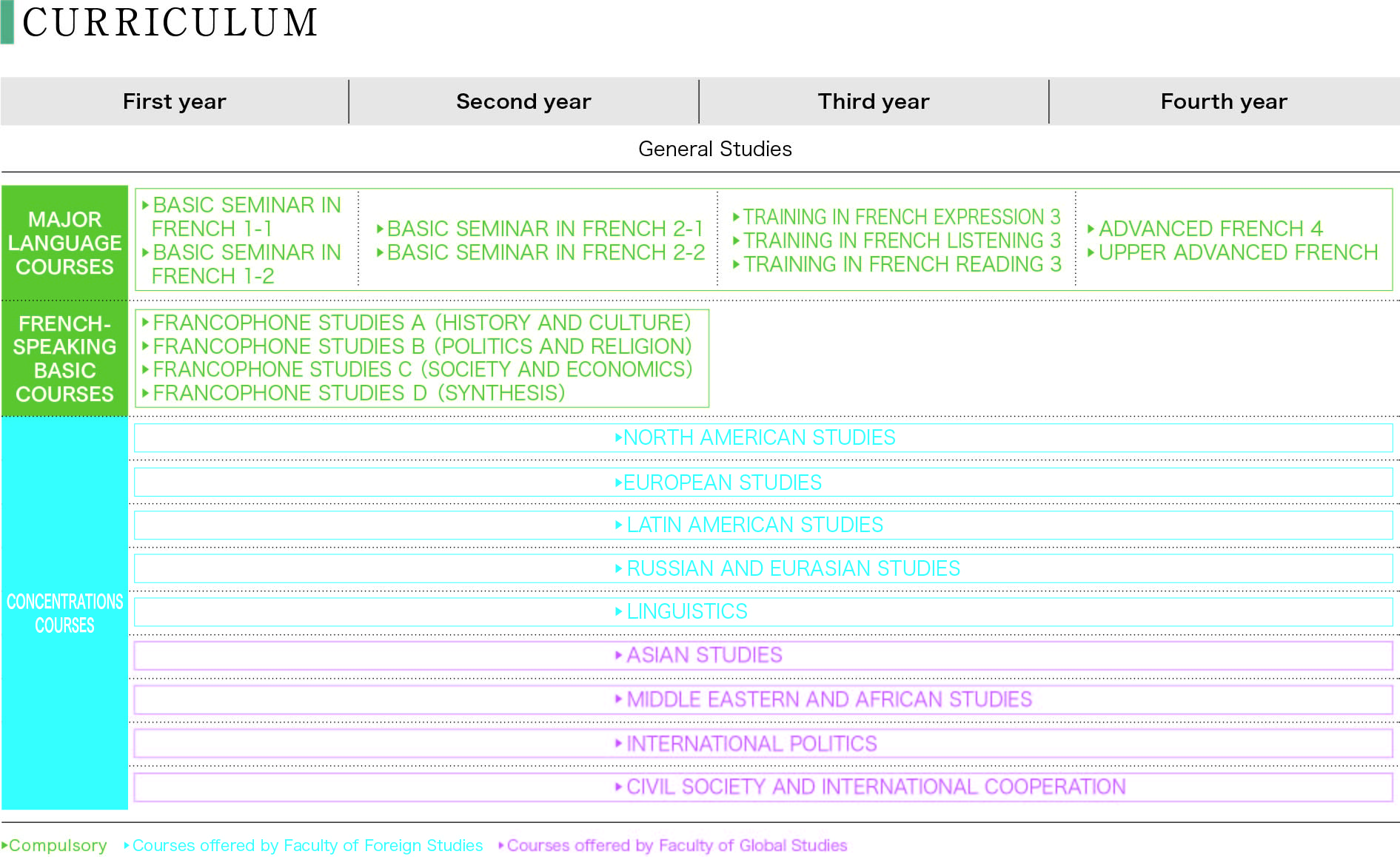Department of French Studies


Department Features
France is a central player within the European Union and one of the world’s leading countries. The French language is spoken in the second largest number of countries and regions in the world. In addition to acquiring a high level of practical French language skills that can be used in a wide variety of countries and regions, the department offers a comprehensive study of France and the French-speaking world.
Many of our students also have the opportunity to study abroad for a year. There are 30 institutions of higher education in France alone that offer exchange programs. Students can also study in Switzerland, Belgium, and Canada. The department provides extensive support for students studying abroad. Students will grow both intellectually and personally through a variety of local learning experiences in French and concrete cross-cultural experiences.
Curriculum
In the first and second years, students learn the fundamentals of the four French language skills in depth, and in the third and fourth years, they receive more practical training to acquire advanced operational skills.
In the third year, students are required to choose one of nine research courses and conduct specialized research under the supervision of faculty members specializing in philosophy, linguistics, sociology, political science, economics, history, social development theory, international relations, etc., and to integrate these research themes into their graduation thesis or thesis project. These research projects culminate in a graduation thesis or graduation research project. By making full use of both French and specialized fields, students acquire the essential skills needed to play an active role in today’s globalized society.
as of 2022
* Please refer to the syllabus for more information on the courses.
Course Examples
- Basic Seminar in French 1
Students will comprehensively develop the four skills of French (reading, listening, writing, and speaking) while building a solid grammatical foundation. The classes are taught by a team of Japanese and native French teachers at a high density of six lessons per week.
- Basic Seminar in French 2
As in Basic French I, six classes per week are offered. While improving grammar and conversational expression, students are also exposed to specialized fields such as sociology, linguistics, history, political science, and economics, and acquire knowledge and advanced reading skills for research in the third and fourth years.
- French Integrated Skills
The program consists of a group of subjects designed to reinforce the four skills, such as expression exercises, listening comprehension exercises, and reading exercises. We also offer subjects such as Comprehensive Exercises and Special Exercises to strengthen students’ overall French language skills.
- Francophone Studies A (History and Culture)
Students study the history of France from the Middle Ages to the present day, as well as the geography of France and the French-speaking world, and develop the basic knowledge necessary to pursue specialized research. Students will also acquire presentation skills.
- France in International Relations
Students will learn how to look at international politics with a focus on France. We will examine France’s ideal image of the nation and the development of its reality from the European and global dimensions, and grasp the characteristics of French diplomacy that differ from that of the hegemonic nation of the United States.
- Society and Developmemt in North Africa
The course focuses on specific issues such as population, family, labor, poverty and inequality, food problems, and water resources in the Middle East and Africa, with a focus on North Africa, and provides students with a social scientific perspective and analytical methods on major development issues.
Available Teaching Licenses and Subjects
- First Category Teaching license for Junior High School (French)
- First Category Teaching license for High School (French)
Curatorial courses are available.
Educational Objectives and Policies
-
To cultivate advanced proficiency in the French language and impart a broad base of knowledge (of humanities, social sciences, and the basic features of the French-speaking world) that will provide the foundations for specialized research in fields such as area studies and linguistics.
-
To produce individuals capable of contributing to increasingly globalized societies through advanced proficiency in the French language, and experts in research related to area studies and linguistics.
-
The Department of French Studies sets standards for the skills and knowledge students should acquire before graduations as described below. Those who fulfill the graduation requirements shall be deemed to have acquired these qualities and will be awarded a diploma.
The Department aims to have all students reach a level of proficiency equivalent to “B2” (level sufficient to study at an overseas university) under the Common European Framework of Reference for Languages (CEFR) at the timing of graduation and furthermore to have as many students as possible reach a level equivalent to “C1” (level sufficient to study at an overseas university)
- Abilities related to receptive activities, including “listening” and “reading” French.
- Abilities related to productive activities, including “speaking” and “writing” in French.
- Abilities related to interactive activities, including communicating and negotiating in French
- Activities related to mediating activities, including interpreting and translating French
- The ability to understand the history, politics, economy, society and culture of French-speaking areas in the context of their global status and comparisons with Japan.
-
In accordance with the Diploma Policy, the Department of French Studies constructs its curriculum with courses aligned with the following purposes:
- 【Major Language – Compulsory Courses (Basic French I, II) 】These courses aim to have students acquire basic French proficiency across the four skills of “listening, speaking, reading and writing” in their freshman and sophomore years. Multiple faculty members (both Japanese and native speakers) engage in team teaching, using lectures, group work, pair work, and presentations, in accordance with the purpose of the class. Students are expected to participate in class proactively and to make daily study plans, including preparation and reviewing of classes.
- 【Major Language – Compulsory Courses (Integrated French) 】These courses aim to have students use the fundamental academic skills acquired in their freshman and sophomore years to learn high level skills to practically use their language skills in reading comprehension, expression and reading seminars targeting juniors and to acquire integrated French proficiency for applied use in integrated seminars for seniors. Classes take multifaceted forms, centered on group work and presentations.
- 【Major Language – Basic Area Studies Courses】These courses aim to have freshmen and sophomores acquire the fundamental cultural knowledge of the history, politics, economics, society, culture and language, etc. of countries and regions of the French-speaking world required in learning about the French-speaking world using French. Furthermore, students will acquire fundamental academic skills, including literature searching and report compilation.
-
- Seeks students interested in various issues associated with the language, history, politics, economy, society and culture of French-speaking countries and regions, and motivated to acquire a high level of French proficiency;
- Generally seeks students who wish to study French for the first time at the Department of French Studies, but also welcomes students with some experience in learning French who are prepared to be committed to enhancing their French proficiency through renewed systematic learning; and
- Expects students to pursue specialized studies in the discipline or geographical area chosen from the nine Concentrations offered at the Faculty of Foreign Studies, supported by their practical proficiency in French or other foreign languages.
Faculty Members
Erina IWASAKI Professor
Akeo TAKAHASHI Professor
Simon TUCHAIS Professor
Sanae HARADA Professor
Yoko MAKI Associate Professor
